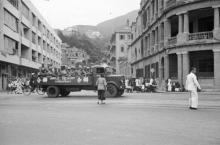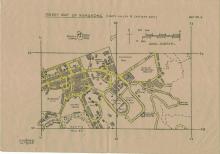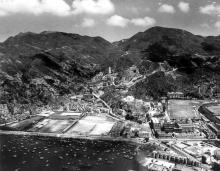The Hospital website gives a brief history of the hospital:
Introduction
St. Paul's Hospital is run by the Sisters of St. Paul de Chartres Order. It started its medical mission in 1898 by looking after the poor and the underprivileged in Wan Chai and Happy Valley. The Hospital now consists of New and Old Wings. The Old Wing was founded in 1916 and was formally named as St. Paul's Hospital in 1918. The New Wing was founded in 1976. The hospital has over 400 beds with well over 30 departments to provide a comprehensive medical service to the public.
History
In response to the request of Monsignor Augustin Forcade, perfect Apostolic of Hong Kong as well as Bishop of Samos and Vicar Apostolic of Japan, four Sisters of St. Paul de Chartres arrived in Hong Kong on 12 September 1848, after a perilous four months' journey by sea from France. Beginning immediately their holy mission of saving souls for God and serving the poor, the Sisters established the “Asile de la Sainte Enfance” in Wanchai looking after abandoned babies. Later on, their service expanded to education and health care.
When plague ravaged Hong Kong in 1894, many poor children and old women came to the orphanage to look for shelter and care. The Sister used their wits to improvise lodgings for them. Little by little a hospital and a hospice began to take shape.
By the beginning of this century, the Asile de la Sainte Enfance had reached its maximum capacity. To relieve the heavy patient-load in Wanchai, an extension of the hospital called, “Le Calvaire”, was opened in Happy Valley.
In 1916 the whole establishment of the Sister in Wanchai began its gradual transfer to Causeway Bay. The hospital, being the last one to move, was housed in temporary quarters until the hospital building was ready. It was only on 24 March 1918 that it was finally blessed by the Bishop, Mgr. D. Pozzoni. The hospital continues its service to this day, 100 years later.
In documents from / about the WW2 period, it is often referred to as the 'French Hospital", eg:
St Paul's Hospital at Causeway Bay (also known as the French Hospital) was hit by more than 200 shells [during the fighting]. The building still exists. [It still existed when Tony wrote the book in 2004, but as T points out below it has since been re-developed.]
- From 'Not the Slightest Chance', by Tony Banham.



Comments
St.Paul's
Glad to see the place where i was born,some 62 years ago, still stands!
Thanks David.
Re: St. Paul's Hospital
Hi there,
I believe the original old wing is already gone two years ago. The hospital had gone through endless rebuilding in the past five years so. Now a highrise stood there. The then New Wing had become the old wing.
Best Regards,
T
St. Paul's in WW11
Thanks for this, David.
St. Paul's was one of the two main places in which Allied civilians kept out of Stanley were interned. It was from here that Dr. Selwyn-Clarke ran a medical procurement and smuggling operation, financed by the bankers in the Sun Wah Hotel.
In spite of the presence of about 25 British nationals carrying out 'essential services' (mainly connected to medical and public health matters) and a number of British patients who had been allowed to remain in the Hospital because of age and degree of illness, G. A. Leiper (a banker) noted that there seemed to be some anti-Allied feeling amongst those working in the Hospital, something he thought might be due to pro-Vichy sentiment.
St. Paul's was raided by a naval party in early March 1943 as part of the investigation that followed the arrest of Dr. Harry Talbot, who'd been receiving treatment there and was caught trying to smuggle money back into Stanley.
On May 2, 1943 Selwyn-Clarke and other doctors were arrested on charges of spying and the Hospital was 'locked down' for several days while the gendarmes carried out a thorough search. Eventually Hilda Selwyn-Clarke, their daughter Mary and 16 others were sent into Stanley (May 7).
This party included my father Thomas Edgar, who'd been living in St. Paul's since February 8 1942, and my mother, Evelina, who joined him after their wedding on June 29. My mother returned to St. Paul's to give birth in late October 1950. It was, perhaps not surprisingly, a difficult process, and the man who was eventually called in to wield the forceps was the courageous Hong Kong escaper Gordon King. My mother was sure it was him because she had to pay extra for the services of the senior doctor, so I can be confident that no expense was spared to give me the best possible start in life!
More information:
http://gwulo.com/node/9890
http://gwulo.com/node/9038
http://brianedgar.wordpress.com/2011/12/16/the-reign-of-terror-5-the-blow-falls/
re: St. Paul's hospital
Thanks for all the extra information. I've added a photo of the old building above, and also added a note that the wartime building no longer exists.
Regards, David
The St Paul's Complex
I've found out more about what wartime references to 'internment at the French Hospital' actually mean. Here's the relevant passage from my blog (minus references):
Previously I’d assumed that (the bakers were) living in the French Hospital itself… but in fact, the bakers were billeted in what one source describes as ‘the little city’ of which the hospital was just one part:
The Sisters {of St. Paul de Chartres} began the historic move to Causeway Bay in 1916, transforming the old cotton factory buildings into a convent and novitiate, an orphanage, the Anglo-French School and St Paul's Hospital. In the middle of this little city would reign Christ the King enthroned in an imposing chapel dedicated and blessed on May 10, 1930.
There is occasional confusion in the sources because the Sisters also had a convent with a school attached at a site in Happy Valley – Le Calvaire, which is sometimes also referred to as ‘the French Convent’. The Happy Valley site was actually taken over by the Kempeitai, the dreaded military police, during the war.
A good picture of the set-up in the Causeway Bay complex is given in what is in effect the Hong Kong Jesuit 'hostilities diary: both the hospital and the school adjoining were used to treat casualties in the hostilities, both having room for about 300 patients, suggesting a very rough equivalence of size. There was also a convent building, and in December 1941 about 130 orphans were living there, as well as the sisters and 'some boarders who were stranded by the war - the Jesuit estimate the total here as another 300. The Girls' Hostel - part of the convent? - was used for the lay nursing staff, and there was a creche with seventy babies and thirty women, some of whom were amahs and the others invalids. The population of the whole hospital enclosure is given as 500-600 with room for up to 600 patients.
So does any of the rest of the complex – chapel, convent, school and perhaps orphanage and creche – still exist?
Re: The St. Paul's complex
Hi there,
Part of the hospital old wing, as well as the Chapel still exists. Part of the perimeter wall still exist as well. The school had been rebuilt though. The Convent had also been rebuilt. However I think there is still an older block. It looked post war though.
Best Regards.
T
Thanks very much for this. I
Thanks very much for this. I was particularly interested in your comment on the wall, and the photo which shows part of it.
On August 11, 1942 R. E. Stott got over the back wall at dusk to begin his escape from the Hospital. He climbed up a gardener's shed which leant against the wall and then jumped into the lane, spraining both his heels. He crawled along a nullah and had to avoid prostitutes and their clients, who used the lane regularly at about this time.
I appreciate the shed's probably gone! But are you able to identify the lane?
re St Paul's
Actually I think the old wing - Block A - still largely exists, though hard to tell the building dates to 1917. It's adjacent to the tall block. If you compare the picture 3rd from end here:
http://www.hk-cc.com.hk/sc_webcat/ecat/project_listing.php?lang=1
with this 1960 photo here:
http://www.flickr.com/photos/65603462@N03/6820183575/
you can see they are the same height, design - though the modern day version appears to have lost all its finer features.
Here it seems they've been restoring it:
http://goo.gl/maps/ePpNN
also this building still exists adjacent to the chapel - I guess from 1930s or 1940s:
http://commons.wikimedia.org/wiki/File%3AHK_Causeway_Bay_Cotton_Path_%E8%81%96%E4%BF%9D%E7%A5%BF%E4%BF%AE%E9%99%A2_Saint_Paul's_Convent_facade.JPG
The nullah
The nullah that Stott describes crawling along is probably the one visible in this photo: http://gwulo.com/node/7803
Regards, David
80sKid and David: Thanks
80sKid and David:
Thanks very much for these very useful images. It's good to know I might be able to see of the wartime buildings one day.
I can understand why Stott needed the garden shed to get over the wall and why he hurt himself landing.
I'd like to know what happened to him after his escape, but all I've been able to find is the death of his wife in 1967:
http://gwulo.com/node/8741
St Paul's Hospital centenary
On returning to HK exactly one year ago for a short and long delayed visit, we were very pleased to see the hospital looking pretty much the same as it was in 1970/71 when our two sons were born there. Not a doctor in sight even though one delivery was a breech, just a very competent sister in full habit attended by a bevy of equally competent accolytes . Truly, loving care!
Nick
St.Pauls Hospital
My mother, Carolyn Howell, took refuge at St.Pauls Hospital after the Japanese invasion. According to her story, she left her house a Deep Water Bay to try to find out what had happened to my father, not knowing that he had already been captured and was on his way to Japan on the fated Lisbon Maru. My mother told me how she helped out at the hospital, always sleeping on a hugh pile of mattresses to avoid rape by the Japanese soldiers. She was eventually sent to Stanley with other civilians and had no news of my father until after the war.
Just a short note to let you
My father was unable to go to my birth as he was playing Lawn Bowls and won the HK Singles on that same day!
My mother was treated by Gordon King until she and I moved to Shanghai.
Reaction to Rob's comment on Sr John and Sr Rita
Hello Ron,
I had two grand aunts ALSO Sr John and Sr Rita who were nuns at St Pauls. They were my grand mother's sisters. My grand mother was Cecilia da Silva nee Gardner. Is it just a coincidence or are we distantly related?
I was back in HK in 2004-5 working on the redevelopment of the St Paul's Hospital as well as work on her sister hospital St Teresa's hospital in Kowloon. Remembered old St Paul's very well, used to visit grand aunts regularly in the 50s and 60's.
Bob
Memories of St Paul's Hospital 1941/42
I was interested to read that someone's mother had sought refuge in the hospital during and after the Japanese attack in December 1941, because the mother in law I never got a chance to meet was killed in close by Tai Hang village at that time. My wife and I have always wanted to know more of the conditions that prevaled at that time, but no story of the attack I have read has ever mentioned the Causeway Bay area, only nearby North Point. At the risk of being thought overly mauldlin we did note the connection between her death and the birth of her only two grandsons at St. Pauls, only a few hundred yards away, thirty yeras later.Thank you.
Carolyn Howell
Adrienne : Do you know the name of the house your parents lived at in Deep Water Bay. Most of the villas were along Island Road between DWB and Overbays Road Junction - one of these houses was commandeered for HKRNVR shore base and another was occupied by Naafi. Philip
Sr John and Sr Rita
Hello Bob,
From the information we have on the site and your comments, I think Ron's mother was your grandmother's sister. I've listed what I think are the father & children at https://gwulo.com/node/42486
Corrections & extra information for that page welcome!
Regards, David
Sr John and Sr Rita
Thank you David.
I have only in the last decade made contact with my 'unknown' first cousins on my mothers side and became aware that my grand mother had more brothers and sisters than I knew of so Ron amongst others would be my second and more distant cousins.
When I've completed my research into my father's side if the family I will 'dig' into my mother's side.
Regards Bob
St.Pauls Hospital
I believe the house was called Zara. After being released from Stanley, my mother walked all the way there to see if anything remained. She was haunted by what had happened to her dogs. The house must have been opposite one of those small islands as my mother used to go swimming with the dogs there every day. I wish I knew where it had exactly been.
Zara
Thanks, Adrienne. I think I know roughly where it would have been ....on the shoreline opposite Middle Island. The water is quite shallow and you can swim across to the island. There were several houses along that stretch of shore. I will see what I can find out. I see from Gwulo that there was a house by the name of Zara and Tara at DWB - I wonder if they were next door to each other - perhaps owned by the same person. Philip
St. Paul's Hospital
Thanks, Philip, I would really appreciate it.
By the way, I, myself, later went to St. Paul's Convent School.
St Paul Hospital
I was born in this hospital 52 years ago and baptised in 1988. I am not sure if the old wing is still there. The whole hospital site is not the same anymore.